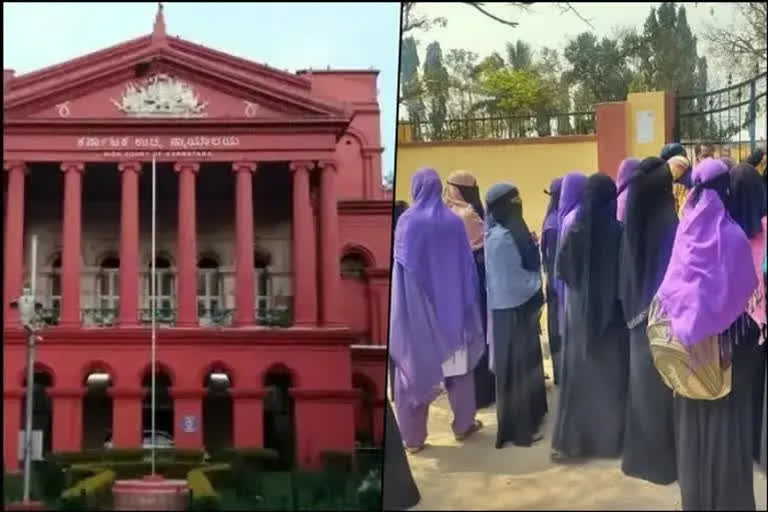Bengaluru: Full bench of the Karnataka High Court, which concluded hearing the Hijab row on Feb 25, is likely to pronounce its verdict on Tuesday at 10:30 am. Hijab-wearing girls and women in the State are anxiously awaiting some relief with the verdict as their lives have come to a standstill without the right to wear Hijab (what they consider a fundamental religious practice) and attend classes. Here's a timeline of events that took place since the end of December 2021 which went on to snowball into a national controversy.
- Hijab row started in a PU college in Udupi on December 31, 2021 as a bunch of girls said in a press conference that they were being prevented from entering the classrooms for wearing Hijab by their principal. The girls' said that they had been wearing Hijabs since they joined college and the ban has come out of nowhere. On the other hand, authorities said the ban has been in place for nearly three decades and it is the girls who are starting a "new thing". Not allowed to enter the college or attend class, girls started protesting outside with their parents
- Within days, few other colleges in the district also banned Hijab wearing girls from entering the college. At the same time, influenced by right-wing propaganda, boys started coming to schools wearing saffron shawls and arguing that if Muslim girls had the right to wear Hijab, they too had the right to wear saffron shawls. Some colleges closed to avoid escalation of tension but the issue was already a part of national political discourse.
- By February 5, Karnataka government banned students from wearing anything religious which would disturb "equality, integrity and public order" to colleges. This prompted the girls from PU college in Udupi to knock on the doors of the High Court. At the same time, there were instances of violence like stone pelting in some pockets of the state prompting the closure of schools and colleges in Karnataka for nearly two weeks. On February 9, Karnataka Police also prohibited gatherings, agitations, or protests of any type within a 200-meter radius from the gates of schools, PU colleges, degree colleges, or other similar educational institutions in Bengaluru city till Feb 22.
- On February 8, Justice Krishna S Dixit started hearing the batch of petitions on the Hijab row. By Feb 9, he referred the hearing to a larger bench with "regard to the enormity of questions of importance." Senior Advocate Devadatt Kamat, arguing on behalf of the petitioners, asked for an interim relief, which was declined. Arguing on behalf of the state, Advocate General said that the dress code prescribed by the college should be followed. Later, section 144 was imposed in some pockets to avoid escalation of communal tension.
- On Feb 9, Karnataka High Court formed a larger bench of three senior judges led by the Chief Justice to hear the Hijab row plea. The 3-judge bench headed by Chief Justice Ritu Raj Awasthi had Justices Krishna S Dixit and Jayabunnisa M Khazi who started hearing the row on February 10 at 2:30 pm. The hearing went on for the next two weeks.
- On Feb 10, the full bench declined the plea for interim relief. However, the bench barred the wearing of Hijab, saffron shaws, or head scarves in schools until final directions from the court. The court also directed Karnataka to reopen educational institutions. Chief Justice asked the media to be "responsible" as the fourth pillar. Senior Advocate Devadatt Kamat argued that students had been wearing Hijabs since they started attending college nearly two years ago. He also argued that allowing Muslim women to wear Hijab is a "national practice". Meanwhile, colleges reopened but protests continued as students were not willing to give up religious practice they considered to be important to attend classes.
- On Feb 14, as a sign of solidarity with Hijab-wearing girls, Congress MLA Kaneez Fathima attended the joint session of the State Legislative Assembly in a hijab and dared anyone to question or stop her. She said, "Wearing hijab is a constitutional right given to the Muslim community. No one has the right to question this".
- Senior Advocate Kamat continued arguing on behalf of the petitioners for the next few days, clarifying how it is an essential practice of Islam and that students were not asking for a "different uniform" but the right to wear something along with the uniform. He argued that Article 25 of the Constitution allows it. Referring to the Shirur Mutt case and the Ratilal Gandhi case, Kamat said that matters of dress can form integral parts of a religion and no outside authority had any right "to restrict or prohibit them."
- In a bid to score political points against Congress as the Hijab row escalated, BJP shockingly shared personal details of the minor girls, who are petitioners in the ongoing case in High Court against the state's anti-hijab diktat. Karnataka argued that Hijab is not an essential practice of Islam and the Advocate General, quoting Ambedkar, argued that "religious instruction" should be kept outside educational institutions". Additionally, citing the Shirur Mutt case, AG said that there is a clear demarcation between "essentially religious" and "essential to religion".
- On Feb 18, even as the hearing was underway in the High Court, Chandini, an English lecturer at a college in Tumakaru quit because she was told not to wear Hijab or any other religious symbol while teaching. Amid warnings of suspension to protesting students, a Tumkaru college filed an FIR against them. As students continued to protest the Hijab ban, several schools, and colleges either prohibited the protesting students from entering the institution or declared holiday to avoid conflicts.
- After eleven days of back-to-back hearings, on Feb 25, Karnataka HC concluded hearing all the parties concerned and reserved its judgment.



